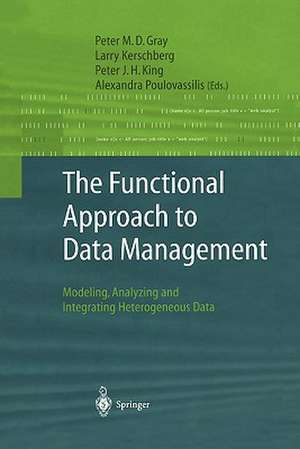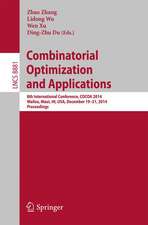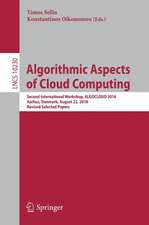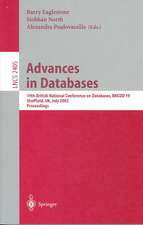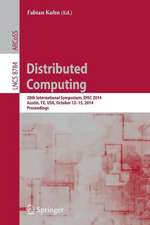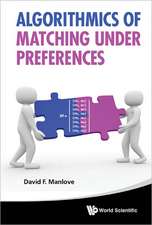The Functional Approach to Data Management: Modeling, Analyzing and Integrating Heterogeneous Data
Editat de Peter M.D. Gray, Larry Kerschberg, Peter J.H. King, Alexandra Poulovassilisen Limba Engleză Paperback – 29 noi 2010
A tutorial introduction by the editors prepares the reader for the chapters that follow, written by leading researchers, including some of the early pioneers. They provide a comprehensive treatment showing how the functional approach provides for modeling, analyzis and optimization in databases, and also data integration and interoperation in heterogeneous environments. Several chapters deal with mathematical results on the transformation of expressions, fundamental to the functional approach. The book also aims to show how the approach relates to the Internet and current work on semistructured data, XML and RDF.
The book presents a comprehensive view of the functional approach to data management, bringing together important material hitherto widely scattered, some new research, and a comprehensive set of references. It will serve as a valuable resource for researchers, faculty and graduate students, as well as those in industry responsible for new systems development.
| Toate formatele și edițiile | Preț | Express |
|---|---|---|
| Paperback (1) | 998.21 lei 6-8 săpt. | |
| Springer Berlin, Heidelberg – 29 noi 2010 | 998.21 lei 6-8 săpt. | |
| Hardback (1) | 1003.50 lei 6-8 săpt. | |
| Springer Berlin, Heidelberg – 15 sep 2003 | 1003.50 lei 6-8 săpt. |
Preț: 998.21 lei
Preț vechi: 1247.77 lei
-20% Nou
Puncte Express: 1497
Preț estimativ în valută:
191.03€ • 207.43$ • 160.47£
191.03€ • 207.43$ • 160.47£
Carte tipărită la comandă
Livrare economică 22 aprilie-06 mai
Preluare comenzi: 021 569.72.76
Specificații
ISBN-13: 9783642055751
ISBN-10: 3642055753
Pagini: 524
Ilustrații: XIII, 506 p.
Dimensiuni: 155 x 235 x 28 mm
Greutate: 0.73 kg
Ediția:Softcover reprint of hardcover 1st ed. 2004
Editura: Springer Berlin, Heidelberg
Colecția Springer
Locul publicării:Berlin, Heidelberg, Germany
ISBN-10: 3642055753
Pagini: 524
Ilustrații: XIII, 506 p.
Dimensiuni: 155 x 235 x 28 mm
Greutate: 0.73 kg
Ediția:Softcover reprint of hardcover 1st ed. 2004
Editura: Springer Berlin, Heidelberg
Colecția Springer
Locul publicării:Berlin, Heidelberg, Germany
Public țintă
ResearchDescriere
It is over 20 years since the functional data model and functional programming languages were first introduced to the computing community. Although developed by separate research communities, recent work, presented in this book, suggests there is powerful synergy in their integration. As database technology emerges as central to yet more complex and demanding applications in areas such as bioinformatics, national security, criminal investigations and advanced engineering, more sophisticated approaches like those presented here, are needed.
A tutorial introduction by the editors prepares the reader for the chapters that follow, written by leading researchers, including some of the early pioneers. They provide a comprehensive treatment showing how the functional approach provides for modeling, analyzis and optimization in databases, and also data integration and interoperation in heterogeneous environments. Several chapters deal with mathematical results on the transformation of expressions, fundamental to the functional approach. The book also aims to show how the approach relates to the Internet and current work on semistructured data, XML and RDF.
The book presents a comprehensive view of the functional approach to data management, bringing together important material hitherto widely scattered, some new research, and a comprehensive set of references. It will serve as a valuable resource for researchers, faculty and graduate students, as well as those in industry responsible for new systems development.
A tutorial introduction by the editors prepares the reader for the chapters that follow, written by leading researchers, including some of the early pioneers. They provide a comprehensive treatment showing how the functional approach provides for modeling, analyzis and optimization in databases, and also data integration and interoperation in heterogeneous environments. Several chapters deal with mathematical results on the transformation of expressions, fundamental to the functional approach. The book also aims to show how the approach relates to the Internet and current work on semistructured data, XML and RDF.
The book presents a comprehensive view of the functional approach to data management, bringing together important material hitherto widely scattered, some new research, and a comprehensive set of references. It will serve as a valuable resource for researchers, faculty and graduate students, as well as those in industry responsible for new systems development.
Cuprins
1) Introduction to the use of functions in the management of data (Gray, King, Poulovassilis) Section I - Advances in information modelling using a functional approach: 2) A functional database language for the associative model of data (King) - 3) Scoped referential transparency in a functional database language with updates (Meredith, King) - 4) Functional approaches to constraint handling and state change (Embury, Gray) - 5) Representing matrices using multi-directional foreign functions (Osborn, Risch, Flodin) Section II - Advances in information integration and interoperability: 6) The Kleisli approach to data transformation and integration (Davidson, Wong - 7) An expressive functional data model and query language for bioinformatics data integration (Gray, Kemp) - 8) Optimization strategies for functional queries in a distributed environment (Kemp, Gray, Embury) - 9) Functional data integration in a distributed mediator system (Risch, Josifovski, Katchaounov) ) - 10) Applying functional languages in knowledge-based information integration systems (Peim, Paton, Franconi) Section III - Advances in analysis and optimisation using a functional approach: 11) Analysis of functional active DBs (Bailey, Poulovassilis) - 12) Monad comprehensions - a versatile representation for queries (Grust) - 13) Query processing and optimisation in Lambda-DB (Fegaras) - 14) A structural approach to query language design (Buneman, Tannen) Section IV - Looking forward to functional approaches for semi-structured data: 15) Functional approaches in internet-based applications (Kerschberg) - 16) A functional approach to XML-based dynamic negotiation in e-business (Yoon, Kerschberg) - 17) An FDM-based constraint language for semantic web applications (Preece, Hui, Gray) - 18) RQL: a functional query language for RDF (Karvounarakis, Christophides) - 19) Functional queries to wrapped educational semantic web meta-data (Risch)
Textul de pe ultima copertă
It is over 20 years since the functional data model and functional programming languages were first introduced to the computing community. Although developed by separate research communities, recent work, presented in this book, suggests there is powerful synergy in their integration. As database technology emerges as central to yet more complex and demanding applications in areas such as bioinformatics, national security, criminal investigations and advanced engineering, more sophisticated approaches like that presented here, are needed.
A tutorial introduction by the editors prepares the reader for the chapters that follow, written by leading researchers, including some of the early pioneers. They provide a comprehensive treatment showing how the functional approach provides for modeling, analyzis and optimization in databases, and also data integration and interoperation in heterogeneous environments. Several chapters deal with mathematical results on the transformation of expressions, fundamental to the functional approach. The book also aims to show how the approach relates to the Internet and current work on semistructured data, XML and RDF.
The book presents a comprehensive view of the functional approach to data management, bringing together important material hitherto widely scattered, some new research, and a comprehensive set of references. It will serve as a valuable resource for researchers, faculty and graduate students, as well as those in industry responsible for new systems development.
Caracteristici
Includes supplementary material: sn.pub/extras
